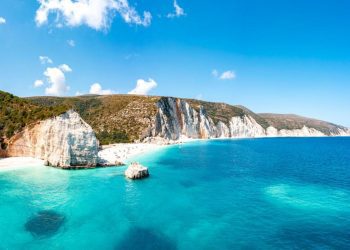
The Greek islands of Santorini and Mykonos are the latest destinations to introduce visitor taxes in an effort to combat overtourism.
The new tourist tax will see cruise ship passengers charged a levy of €20 (£16.88) each for disembarking during peak summer, with the money raised to be invested back into local infrastructure.
‘Greece does not have a structural over-tourism problem [but] some of its destinations have a significant issue during certain weeks or months of the year, which we need to deal with,’ Greek Prime Minister Kyriakos Mitsotakis said in a statement.
‘Cruise shipping has burdened Santorini and Mykonos and this is why we are proceeding with interventions.’
The country’s tourism revenue stood at around €20billion in 2023, but these holiday hotspots have suffered as a result of traveller footfall far eclipsing their small size.
Despite only having an estimated 15,000 permanent residents, around 800 cruise ships carrying 1.3million passengers made stops in Santorini last year, while Mykonos (with a population of roughly 10,000) received 750 cruise liners, each with the capacity to bring up to 14,000 people descending on its tiny port.

Not only does it put a strain on services, these huge influxes of tourists can overwhelm the islands’ cobbled, winding streets, making it difficult for locals to go about their everyday lives.
Alongside this policy – due to be discussed further in the coming weeks – additional measures have been proposed.
Mitsotakis said that the government would be ‘bold’ on intervening on the number of ships arriving at a specific destination at the same time, telling reporters: ‘It is important to observe sustainability rules in everything that is built from now on. To put the brakes on islands where we believe that the situation has reached a point where the infrastructure limits are actually being tested.’

Earlier this week, the Portuguese city of Porto announced plans to increase its tourist tax from €2 (£1.69) to €3 (£2.53) per person per night, while the likes of Venice, Barcelona, and Lake Como have introduced similar fees or increased existing ones this year.
In this case, it’s not yet clear when these taxes will come into effect, or whether operators will pass the costs onto customers directly if they’ve already booked.
However, Will Sarson, cruise expert at Riviera Travel, says: ‘While these fees may have been included in the cruise fare, thoroughly review the cruise line’s terms and conditions to be aware of what costs are included. If you’re still uncertain, contact the cruise line for confirmation.
‘Being aware of what fees have been paid will give you a clearer picture of your finances for the holiday.’
Do you have a story to share?
Get in touch by emailing [email protected].
































